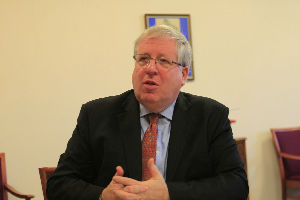Top officials promote new power relations
Updated: 2013-10-23 07:35
By CAI CHUNYING in Washington (China Daily)
|
|||||||||||
|
|
| Video by Cai Chunying. Click to watch on Youtube |
Top business executives and former senior government officials from both China and the US sat down at the US Chamber of Commerce's headquarters in Washington Monday and Tuesday to discuss key issues in US-Chinese economic collaborations.
"The US-China partnership is the cornerstone of this dialogue and it is also the cornerstone of our bilateral relationship," said Thomas Donohue, president and CEO of the US Chamber of Commerce, at the opening ceremony of the summit, which is titled US-China CEO and Former Senior Officials' Dialogue.
"We hope this dialogue will help promote the new type of great power economic and trade relationship," said Zeng Peiyan, a former Chinese vice-premier and current chairman of the China Center for International Economic Exchanges, the government think tank that hosted the dialogue on the Chinese side.
Accompanying Zeng were former senior Chinese government officials who now play various roles in the social and industrial sector, including: Zhou Wenzhong, former Chinese ambassador to the US and current secretary of Bo'ao Forum for Asia, a major platform for economic collaboration among Asian countries, and Jin Liqun, former deputy Chinese minister of finance and vice-president of the Asian Development Bank and now chairman of China International Capital Corp, the first joint-venture and major investment bank in China.
The US side featured former US Treasury Secretary Robert Kimmitt and former US Trade Representative Charlene Barshefsky and incumbents Secretary of Treasury Jacob Lew, Secretary of Commerce Penny Pritzker, and US Trade Representative Michael Froman came and addressed the group.
According to the Chamber of Commerce, one of the goals of the dialogue was to "significantly increase channels for discussion of public policy and related issues between US and Chinese CEOs", while the views from former government officials with ample policy backgrounds provided strong input for the CEOs' discussions.
The Chinese group of corporate heads included Wan Long, chairman of Shuanghui International, which recently bought the biggest US pork producer Smithfield for $4.7 billion — the largest Chinese investment in the US so far; Xiang Wenbo, CEO and president of Sany Group, which built a 360,000-square-foot manufacturing base in Atlanta that employs more than 100 local workers; and Guo Guangchang, chairman of Fosun International, which bought New York City banking landmark One Chase Manhattan Plaza last Friday.
Counterbalancing the CEO roster on the US side were names like Daniel D'Aniello, chairman of the Carlyle Group; Klaus Kleinfeld, CEO of Alcoa; Michael Ducker, president of FedEx; and Rob Speyer, co-CEO of Tishman Speyer, all companies that have robust investment in China.
Building on the four summits that have been held over the past three years, the fifth dialogue focused its discussions on the Bilateral Investment Treaty, an ambitious initiative proposed during the most recent US-China Strategic and Economic Dialogue between the two countries.
Anticipating that the newly-established Shanghai Free Trade Zone would be of great interest to American attendees, Ai Baojun, deputy mayor of Shanghai and director of the Free Trade Zone governing committee, came as a special guest. Participants also discussed the opportunities for Chinese investment in US infrastructure. As a tradition, a joint statement was issued at the end of the summit.
"We will make our collective voice heard in meetings with high-level officials in both countries," promised Zeng at the end of the opening ceremony. As vice-premier, Zeng oversaw economic development in China from 2003 to 2008.
"We are committed to providing continuity of leadership and driving momentum through this dialogue," said Donohue, whose Chamber of Commerce is the world's largest business federation representing more than 3 million businesses as well as state and local chambers and industry associations across the US.
Related Stories
US 'historic' sorghum shipment arrives in China 2013-10-22 05:18
IMAX in China exceeds CEO's expectations 2013-10-16 08:59
90%-plus US firms make profits in China: Report 2013-10-10 23:55
China calls on US to stay solvent 2013-10-08 00:06
China Silicon Valley holds discussion on China-US relations 2013-10-10 03:38
China-US key to global future: report 2013-09-18 11:36
Today's Top News
China, Russia reach big oil deal
Apple unveils new Macs, iPad
Top officials promote power relations
Home prices rise further in Sept
Big challenges lie ahead for urban planners
Firms urged to contact unions abroad
Smart cities to aid urbanization
UN films highlight rise in HIV cases among women
Hot Topics
Lunar probe , China growth forecasts, Emission rules get tougher, China seen through 'colored lens', International board,
Editor's Picks

|

|

|

|

|

|





